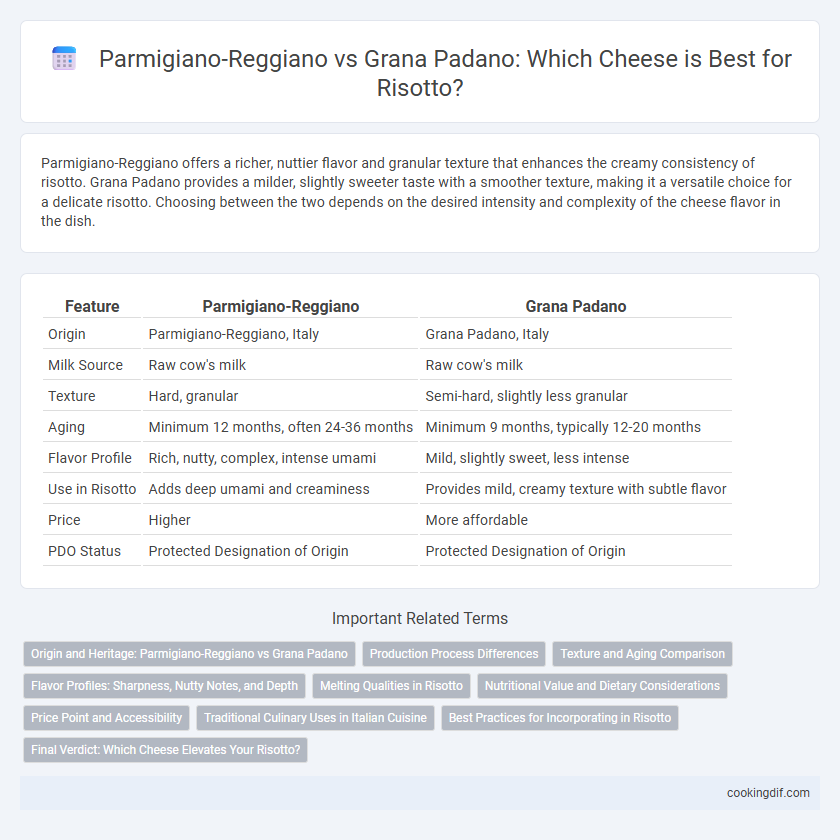Parmigiano-Reggiano offers a richer, nuttier flavor and granular texture that enhances the creamy consistency of risotto. Grana Padano provides a milder, slightly sweeter taste with a smoother texture, making it a versatile choice for a delicate risotto. Choosing between the two depends on the desired intensity and complexity of the cheese flavor in the dish.
Table of Comparison
| Feature | Parmigiano-Reggiano | Grana Padano |
|---|---|---|
| Origin | Parmigiano-Reggiano, Italy | Grana Padano, Italy |
| Milk Source | Raw cow's milk | Raw cow's milk |
| Texture | Hard, granular | Semi-hard, slightly less granular |
| Aging | Minimum 12 months, often 24-36 months | Minimum 9 months, typically 12-20 months |
| Flavor Profile | Rich, nutty, complex, intense umami | Mild, slightly sweet, less intense |
| Use in Risotto | Adds deep umami and creaminess | Provides mild, creamy texture with subtle flavor |
| Price | Higher | More affordable |
| PDO Status | Protected Designation of Origin | Protected Designation of Origin |
Origin and Heritage: Parmigiano-Reggiano vs Grana Padano
Parmigiano-Reggiano originates from specific provinces in Italy including Parma, Reggio Emilia, Modena, Bologna, and Mantua, and is protected by a strict PDO (Protected Designation of Origin) status that preserves centuries-old production methods. Grana Padano is produced in a broader area across the Po River Valley with a slightly more flexible production code, reflecting a different heritage linked to the fertile plains of northern Italy. Both cheeses share a rich Italian tradition but Parmigiano-Reggiano's stricter regional and artisanal controls make it distinctly tied to its cradle of origin.
Production Process Differences
Parmigiano-Reggiano and Grana Padano differ significantly in their production processes, affecting their texture and flavor in risotto. Parmigiano-Reggiano is aged a minimum of 12 months using specific milk from cows fed a strict diet in designated regions of Italy, resulting in a richer, more granular texture. Grana Padano undergoes a shorter aging period of at least 9 months and uses milk from a broader area with fewer dietary restrictions, producing a milder, softer cheese ideal for creamy risotto.
Texture and Aging Comparison
Parmigiano-Reggiano and Grana Padano differ notably in texture and aging, with Parmigiano-Reggiano offering a drier, more granular texture due to its longer aging period of 12 to 36 months, enhancing its complex umami flavor ideal for risotto. Grana Padano ages between 9 to 24 months, resulting in a slightly creamier texture that melts more smoothly into the rice, delivering a milder, less intense taste. The extended aging of Parmigiano-Reggiano contributes to its firmer texture and sharper taste, making it preferred for risotto recipes requiring a robust cheese presence.
Flavor Profiles: Sharpness, Nutty Notes, and Depth
Parmigiano-Reggiano offers a sharper flavor with pronounced nutty notes and a deeper umami richness, enhancing the creaminess and complexity of risotto. Grana Padano presents a milder sharpness with subtle nutty undertones and a lighter depth, providing a delicate complement without overpowering other ingredients. Both cheeses enrich risotto's texture but Parmigiano-Reggiano is preferred for bold flavor intensity while Grana Padano suits gentler, balanced dishes.
Melting Qualities in Risotto
Parmigiano-Reggiano melts smoothly in risotto, creating a creamy texture and rich umami flavor essential for authentic Italian dishes. Grana Padano also melts well but offers a slightly milder and less granular consistency, making it a versatile alternative with a subtle nutty taste. Both cheeses enhance risotto's creaminess, but Parmigiano-Reggiano's superior melting quality and concentrated flavor provide a distinctive depth that elevates the dish.
Nutritional Value and Dietary Considerations
Parmigiano-Reggiano offers higher protein content and richer calcium levels compared to Grana Padano, making it beneficial for muscle repair and bone health in risotto dishes. Grana Padano contains slightly less fat and sodium, accommodating lower-sodium diets while still delivering a creamy texture and nutty flavor. Both cheeses are rich in essential nutrients but differ in lactose content, with Parmigiano-Reggiano typically being more suitable for lactose-sensitive individuals due to its longer aging process.
Price Point and Accessibility
Parmigiano-Reggiano typically commands a higher price point due to its longer aging process and strict production regulations, making it a premium choice for risotto connoisseurs. Grana Padano offers a more budget-friendly alternative with a slightly milder flavor, benefiting from broader regional production that enhances its accessibility in grocery stores and markets. Both cheeses provide rich umami depth to risotto, but Grana Padano's affordability and availability make it a practical option for everyday cooking without compromising quality.
Traditional Culinary Uses in Italian Cuisine
Parmigiano-Reggiano, aged for a minimum of 12 months, is prized in Italian cuisine for its robust, nutty flavor and granular texture, making it ideal for finishing traditional risotto dishes like Risotto alla Milanese. Grana Padano, aged between 9 to 20 months, offers a milder, creamier taste with a less granular texture, often preferred for everyday risottos and recipes requiring a subtler cheese presence. Both cheeses enhance the creamy consistency of risotto, but Parmigiano-Reggiano is favored in regional recipes that highlight intense umami and complex flavor profiles.
Best Practices for Incorporating in Risotto
When incorporating cheese into risotto, Parmigiano-Reggiano is often preferred for its robust, nutty flavor and granular texture that melts evenly, enhancing the dish's creaminess without overpowering. Grana Padano offers a slightly milder taste and a smoother consistency, making it ideal for a subtler cheese presence in risotto recipes. For best results, finely grate the cheese and stir it in off the heat to preserve its flavor and achieve a velvety finish.
Final Verdict: Which Cheese Elevates Your Risotto?
Parmigiano-Reggiano offers a robust, nutty flavor and crystalline texture that deepens risotto's savory complexity, making it the preferred choice for authentic Italian dishes. Grana Padano provides a milder, creamier profile with less aging intensity, suitable for those seeking a subtler cheese accent in risotto. For an elevated risotto experience with nuanced depth and traditional richness, Parmigiano-Reggiano is the superior cheese selection.
Parmigiano-Reggiano vs Grana Padano for cheese Infographic

 cookingdif.com
cookingdif.com